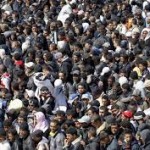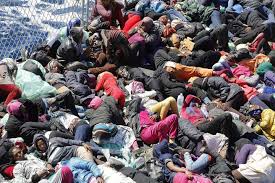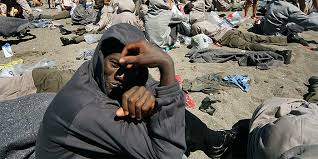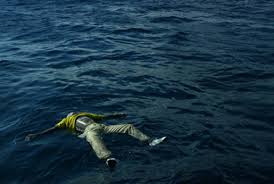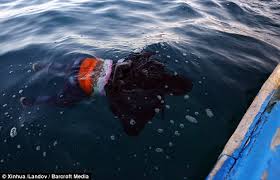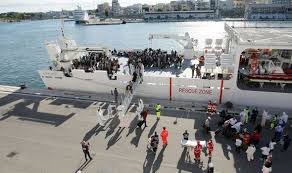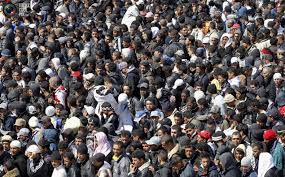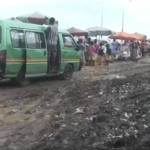Dying Immigrants: Paradox of a continent on the rise
Posted by By Akogun Akomolafe at 8 September, at 11 : 38 AM Print
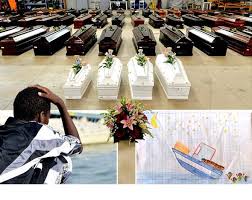
Warning: count(): Parameter must be an array or an object that implements Countable in /home/alaye/public_html/wp-content/themes/Video/single_blog.php on line 56
(published in the November 2014 edition of the New African Magazine)
According to mainstream media, Africa’s economy is growing very fast. The continent is touted as the fastest growing region of the world. The World Bank, IMF, and African governments never fail to tell whoever will listen that seven out of the ten fastest growing economies are in Africa. They spout impressive macro-economic jargons to support their assertions.
But just as Africa remain the best-endowed continent with the most mineral wealth and Africans are the poorest people on earth, the paradox exists of a continent said to be on a fast-growing trajectory, yet has the highest number of people fleeing desperately to escape poverty and disease.
The statistics are as appalling as they are sickening. This year alone, nearly 3,000 would be migrants, in search of better life, have drowned in the Mediterranean – many of them Africans. The International Organization for Migration (IOM) estimated that the figures for this year are already nearly four times that of all of 2013.
Maltese Prime Minister Joseph Muscat described the Mediterranean as a “graveyard.” In the past two decades, about 20,000 people are said to have drowned while trying to reach Europe.
One of the worst tragedies occurred in October last year off the coast of the Italian island of Lampedusa when more than 360 people – mainly from Eritrea, Somalia, and Ghana drowned.
That is in the Mediterranean alone. More Africans perish in the deserts of Sahara and in the Atlantic coast off Morocco. Many more lose their lives in the Sinai in a desperate attempt to reach Israel.
The question thus provoked is: Why do people risk everything, including their lives, in order to escape supposedly growing economies?
Why do Ghanaians, whose officials gushed about economic successes and which the Bretton Woods institutions like to parade as Africa’s Star performer, risk dying in the Sahara and in the Mediterranean, in order to get to Europe and chase non-existing jobs?
Why do people try to escape from supposed paradise?
Three years ago, a Dutch film production house made a documentary film about the life of Ssuuna Golooba, a Ugandan immigrant in the Netherlands. Released as Surprising Europe, it later showed as a mini-series on the al-Jazeera station.
Ssuuna was a photographer with a Ugandan newspaper who caught the travel bug, left his well-paying job and came to the Netherlands, hoping for a better life. He ended up doing odd jobs that did not even begin to challenge his education or intelligence. Like all undocumented immigrants, Ssuuna was in constant fear of being arrested by the Dutch police; the penalty being instant deportation. The pittance he earns cleaning people’s toilet was not enough to pay his rent and utilities. In the meantime, the family he left behind in Ugandan pester him for money.
Surprising Europe beautifully captured the struggle African immigrants go through in Europe. There were scenes of the efforts people made to obtain the Almighty EU Visa, including invoking Divine intervention at churches.
What surprises most was that after the harrowing experience of Ssuuna, vividly portrayed in the film, many Ugandans refused to take heed. A section of students interviewed at the Makerere University at a post-screening session blatantly said that nothing will deter them from pursuing the goal of reaching Europe to try their own luck.
The same fatalism afflicts many Ghanaians. Over 40,000 of them reside in the Netherlands, many of them have been doing menial jobs for several years with absolutely no hope of redemption. Their tales are as harrowing as those portrayed by Ssuuna Gooloba in Surprising Europe, yet many Ghanaians still vote with their feet to seek what they think are greener pastures in a foreign land.
The country was hugely embarrassed during the last World Cup in Brazil when about 180 supposedly football fans asked for political asylum claiming persecution. Since then, many Embassies have flatly refused to grant visas to Ghanaian sports supporters.
THE LAMENTATION OF MANY OF THE GHANAIAN IN THE NETHERLANDS IS: HAD I KNOWN!
There is no doubt that had many of the immigrants known the hassles and the hardship involved, many of them would have preferred to stay at home.
Abena Ofori was a senior nurse at Ghana’s premier hospital, Korle Bu in Accra. Her husband was an architect. Her pay was not bad, but when she saw Ghanaians, who reside abroad, putting up posh buildings across town, she decided to try her luck in the Netherlands. Against the advice of her husband and children, she resigned her post and migrated. Things did not pan out as she planned. She discovered to her horror the type of job that some of the women do (including prostitution) to put up the mansions she so envied. Almost fifteen years later, she still ekes out miserable existence taking care of drooling old people. She shares a tiny one-room and the rent consumes most of what she gets from the three-hour job. The husband has divorced her and moved on. The colleagues she left behind had received salary boost and generous loans that allowed them to build their own houses and live middle-class lives. Today, totally disillusioned, she cursed the day she decided to leave Ghana. Shame alone will not allow her to show her face in Ghana; the stigma attached to failure is potent.
Many Ghanaians left good-paying jobs and spent considerable sums to get to Europe, where they are confronted with every manner of obstacles, several of them totally confounding. There is the language barrier to overcome. There is the inclement weather to brave. There is the formidable Residence Permit hurdle to cross. There is pervasive racism to endure. Let us not mention food and the other small joys of life that one takes for granted in one’s own country.
On paper, pay looks okay. Translated into Ghanaian currency, the cedi, it is a small fortune. But then it looks like some very crafty Civil Servant sat down to calculate that what you earn is precisely what you need for a very basic existence. After rent and utilities, you are left with barely enough to put food on the table. There is little to do except to start to borrow money to balance the home economy. Before long, the debt has piled up. Bad debt is nightmarish especially when there is little hope of redeeming it anytime soon. Taking on more jobs only add to the trouble. For some strange reasons, the harder you work, the less you have in your pocket. Travelers on dawn and night trains in the Netherlands will be familiar with the sight of Ghanaians on the way to and from work at the oddest of hours. They are to be found cleaning Schiphol Airport and the train stations of the Netherlands. The women split their time between cleaning offices and taking care of old people at Hospices.
Such unrewarding jobs lead to alienation and discontentment. The result is pervasive alcoholism. This is compounded by very bad eating habit occasioned by the odd hours the people work.
About two years ago, Ghanaians in the city of Amsterdam stunned their Dutch hosts when they gathered to perform an exorcism on the Amstel River, which they believe is responsible for the soaring death of their compatriots. They superstitiously blamed the soaring death rate in their community on the anger of the river gods.
A Ghanaian medical doctor, epidemiologist and public health scientist at the University of Amsterdam Medical Center, Dr. Charles Agyemang, blamed ignorance for the move and explained that the debilitating diseases afflicting many Ghanaians and the seemingly unnatural high death rate can be explained by the low-quality lifestyles people live. Bad eating habit, heavy consumption of alcohol and lack of regular exercises are also contributory factors, Dr. Agyemang maintained. He now regularly participate in radio discussions to enlighten the Ghanaian community.
Envy also comes into the equation as Ghanaians who made trips back home after many years abroad see how far the country has left them behind. Thinking that they live in civilized, wealthy Europe, it shocks to see that Ghana today was not the same as they left behind thirty, twenty and ten years ago. Depression sets in when they see that many of the mates they left behind are now BIG men and women with houses of their own and some with fleets of expensive cars.
There is also the perceived lack of appreciation. Many grumble loudly that they slave to help families back home. Statistics support them as Ghanaians are among the leading Diasporans that remit money home. Many complained that not only did their families abused their generosity and occasionally swindle them, they also faulted the government seemingly lack of appreciation of their efforts.
Ghanaian academic, Adams Bodomo, calculated that Diasporan Africans sent more money home to their families than those given by Western aid donors. His figures for 2010 show the African diaspora remitted US$51.8bn to the continent. In the same year, according to World Bank figures, total official aid to Africa was US$43bn.
Ghana share is about US$5billion. A considerable sum in the country’s budget of about US$10 billion.
Money from remittances dwarfs gold contribution (about US$2billion per annum) to the Ghanaian economy.
Mr. Bodomo figures show that Ghana gets more money from her Diaspora than from any other source. So, the complaint of neglect by the Diasporan Ghanaians have some justifications.
While Tourism which contributes about contributes about …% to the budget has a full-fledged ministry devoted to it, Diaspora affairs is just a desk at the Ministry of Foreign Affairs and Regional Integration.
In an interview with the Foreign Minister, Madam Hannah Tetteh, last year, I asked why successive governments have paid what could be described as lip service to the question of the Ghanaian Diaspora.
Her answer was revealing. “I honestly do not believe that Ghanaians in the Diaspora are entitled to any special dispensation.
What we shall try to do as a government is to try and create a viable environment for every Ghanaian, irrespective of where they reside, to realize his or her full potentials.
I also have heard the Diasporan clamor to be given certain entitlements because they said that they have helped with remittances and such.
I don’t think that citizens are entitled to special treatment on the basis of remittances that were sent to mainly family members and for their personal expenses.
I just don’t believe that the basis for any special consideration should be remittances to friends and family.”
It does not look like the troubled Ghanaian immigrant will find solace from home or abroad anytime soon.
But as the saying goes, there is no place like home. The challenge for Africa is to abandon the devastating neo-liberal policies and devise new economic paradigms that will allow her children to use her abundant resources to take good care of themselves.
Given her abundant mineral wealth, it is only bad policies that could be blamedd for the sight of Africans fleeing as economic refugees.
About the Author
Femi Akomolafe is a passionate Pan-Africanist. A columnist for the Accra-based Daily Dispatch newspaper and Correspondent for the New African magazine. Femi lives in both Europe and Africa and writes regularly on Africa-related issues for various newspapers and magazines.
Femi was the producer of the FOCUS ON AFRICANS TV Interview programme for the MultiTV Station.
He is also the CEO of Alaye Dot Biz Limited Dot Biz, a Kasoa-based Multimedia organisation that specialises in Audio and Video Production. He loves to shoot and edit video documentaries.
His highly-acclaimed books (“Africa: Destroyed by the gods,” “Africa: It shall be well,” “18 African Fables & Moonlight Stories” and “Ghana: Basic Facts + More”) are now available for sales at the following bookshops/offices:
- Freedom Bookshop, near Apollo Theatre, Accra.
- The Daily Dispatch Office, Labone – Accra
- WEB Dubois Pan-African Centre, Accra
- Ghana Writers Association office, PAWA House, Roman Ridge, Accra.
- African Kitchen in Amsterdam Bijlmer
Where to buy them online:
On Lulu Books:
18 African Fables & Moonlight Stories https://goo.gl/Skohtn
Ghana: Basic Facts + More: https://goo.gl/73ni99
Africa: Destroyed by the gods: https://goo.gl/HHmFfr
Africa: It shall be well: https://goo.gl/KIMcIm
Africa: it shall be well
on Kindle books: https://www.createspace.com/4820404
on Amazon books: http://goo.gl/QeFxbl
on Lulu Books: https://goo.gl/SQeoKD
Africa: Destroyed by the gods
on Kindle books: https://www.createspace.com/4811974
on Amazon books: http://goo.gl/1z97ND
on Lulu Books: http://goo.gl/KIMcIm
My Lulu Books page: http://www.lulu.com/spotlight/FemiAkomolafe
Get free promotional materials here:
- Africa: it shall be well: http://alaye.biz/africa-it-shall-be-well-introduction-in-pdf/
A FREE Chapter of ‘Africa: It shall be well’ could be downloaded here: http://alaye.biz/africa-it-shall-be-well-a-free-chapter/
- Africa: Destroyed by the gods (How religiosity destroyed Africa) http://alaye.biz/africa-destroyed-by-the-gods-introduction/
A FREE Chapter of ‘Africa: Destroyed by the gods’ could be downloaded here: http://alaye.biz/africa-destroyed-by-the-gods-free-chapter/
Contact Femi:
Femi’s Blog: www.alaye.biz/category/blog
Website: www.alaye.biz
Femi on Amazon https://www.amazon.com/author/femiakomolafe
Twitter: www.twitter.com/ekitiparapo
Facebook:https://www.facebook.com/alayeclearsound;
Gmail+: https://plus.google.com/112798710915807967908;
LinkedIn: www.linkedin.com/in/femiakomolafe
Email: fakomolafe@gmail.com
Kindly help me share the books’ links with your friends and, grin, please purchase your copies.
Comradely,
Femi Akomolafe
Alayedotbiz, Blog, Book Review, Interviews, Miscs, News, Polemics, Random Musings, Satire

